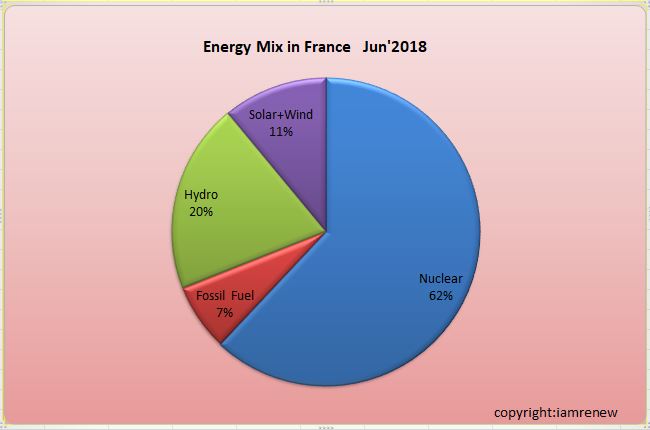

Back in January, when French president Emmanuel Macron announced bringing forward the date for closure of coal plants in the country to 2021, from 2023 originally, it was considered a largely symbolic move. France is a country that has taken to nuclear power with a vengeance, with 75% of the country’s power being supplied from its 58 nuclear power plants. This is the highest national share in the world when it comes to nuclear power. The only other country which had similar plans was Japan, where the nuclear sector contributed 30% of its power needs in 2011, with further plans to take it to 40%, before the Fukushima disaster put paid to that.
Helping make France completely fossil fuel free by 2021 will be renewables, which hit a new high of 31% share in electricity consumption by June 2018. This was helped along by a sharp increase in Hydropower generation, which covered 20% of the consumption. Renewables like Solar and Wind, which had never gone beyond a 10% contribution, rose to cover the remaining 11% for the first time. It’s a trend that the French will hope to build on, as they add on more renewables and continue to explore the long-term future where dependency on nuclear may not be considered attractive possibly. In fact, president Macron had promised to target reduction of nuclear to 50% by 2025, a promise that looks impossible to keep at the moment.


India, for comparison’s sake, has 7 nuclear power plants providing barely 2.5% of its energy needs. Thanks to this low share, India cannot even consider a drop in contribution from fossil fuels in its total energy generation right upto 2040, which seems guaranteed to place it under the global spotlight if climate change impact continues to accelerate. Even as total SHARE of fossil fuels can be brought down to a low of 50% by then, by official estimates.
For France, the shift away from the steadfast and dependable nuclear power might seem like a bad idea when considered against the cost of renewables like solar and wind, but to its credit, the country is doing it mainly due to pressure from its own citizens, who no longer want to carry the risk of nuclear disasters. France has also been one of the founding members of the International Solar Alliance, (ISA), along with India, the strongest indicator yet that the country seeks to do much more than just make the transition to ‘friendly’ renewables. The country has traditionally done well in technological innovations in the space too, though, like most things French, those have come at a price considered too high by most potential customers. It remains to be seen how the country will carve a share of the emerging new market for renewables for itself.
Mumbai headquartered bioenergy engineering & tech major Organic Recycling Systems Ltd (ORSL) has launched a…
India is undergoing a significant influx of urban migration and a reclassification of rural areas,…
India’s quest toward green hydrogen economy received a significant boost with a strategic MoU between…
A new report by S&P Global has revealed that India’s growing biofuels industry is emerging…
In a significant breakthrough for India’s renewable energy and dairy sectors, dairy major Amul has…
Renewable energy conglomerate Anaergia Inc, through its subsidiary, Anaergia S.r.l., entered into a contract with…